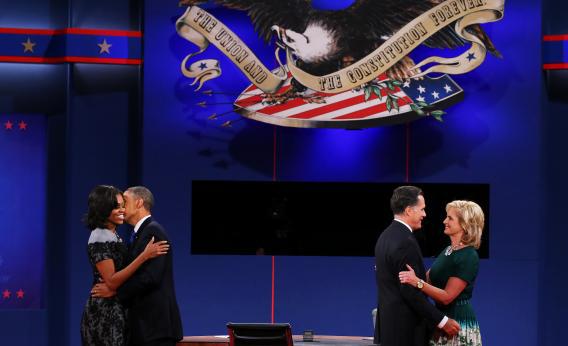Jaclyn Friedman at the American Prospect has written an excellent piece on the expansion of the role of first ladies and would-be first ladies in campaigns. Friedman argues that the image that campaigns cultivate of the ever-supportive wife who has no existence outside of her family-life hurts basically everyone but the candidates themselves. It hurts women by being an obvious setback for feminism. It hurts voters, because it creates a distraction from the relevant policy issues. And, as Friedman astutely observes, it creates a paradigm for presidential campaigns that excludes female candidates, as well as anyone who doesn’t conform to the heterosexual ideal that’s implicit in both the Romney and Obama family tableaus. It’s hard enough to imagine a first gentleman, much less an unmarried, childless, or even a queer candidate.
All very good points, but I still think there’s something valuable in the first-lady contest. As Friedman notes, the sizing up of presidential candidates’ wives is a national referendum in the ongoing culture war to define American womanhood. While that creates serious problems for feminists, it’s also an opportunity, because it gives us so much information. The spectacle of the battle of the first ladies gives us a chance to gauge how Americans actually feel about the idea of womanhood, and what ideals they find attractive and which ones they’re leaving behind. If we want to change how Americans view women, we need to know where they’re at right now, and the fact that cookie-baking still matters to a lot of people is information we should have.
Reading Noreen Malone’s piece in the New Republic about Ann Romney’s image helped me realize this. It would have never occurred to me that a lot of Americans still romanticize the idea of marrying your high school sweetheart or that people still think there’s honor in marriages that subsume the individuals into the concept of “us.” In part, that’s because no one I know, liberal or conservative, actually lives like that. But as Noreen writes, Ann Romney captures a “simmering wistfulness” for an era when women knew their place and love means being attached at the hip. That fantasy must be pretty widespread, as Romney’s approval ratings are close to Michelle Obama’s at this point. Knowing this helps me understand, for instance, why so many conservatives become unhinged with anger at the very existence of a Sandra Fluke or a Stephanie Cutter. They’re comparing them to women like Romney, imagining that these women would have ended up as cookie-baking political spouses in an alternate universe where second wave feminism didn’t happen, and that perceived loss creates anger.
While Michelle Obama does have to clip her wings a bit while campaigning for her husband, I think she taps into a much different and growing fantasy of ideal womanhood. For her fans, of which I consider myself one, the Obama marriage gives us hope. We’re constantly bombarded with dire warnings that being a feminist and having power and being outspoken means a life of loneliness, but it seems evident that all these qualities are actually what drew Barack to Michelle in the first place. Same story with the Clinton marriage: The nerdy feminist draws the cutest boy in school! Yes, it’s just as much a fantasy as the five-kids-and-a-Cadillac dream the Romneys present, but that’s the point. Knowing someone’s fantasies gives us so much insight into who they are and what they want. The first lady contest is, ultimately, a chance to really get to know what Americans think about where women should stand.
